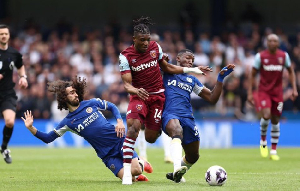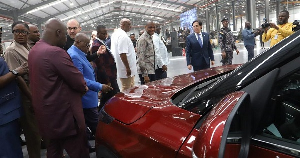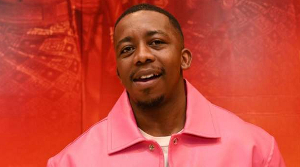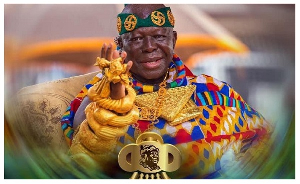- Home - News
- TWI News | TV
- Polls
- Year In Review
- News Archive
- Crime & Punishment
- Politics
- Regional
- Editorial
- Health
- Ghanaians Abroad
- Tabloid
- Africa
- Religion
- Election 2020
- Coronavirus
- News Videos | TV
- Photo Archives
- News Headlines
- Press Release
Editorial News of Monday, 21 August 2000
Source: Washington Post
Ghanaian May Retire to Position of Power
By Douglas Farah Washington Post Foreign Service
ACCRA, Ghana –– When 34-year-old Flight Lt. Jerry John Rawlings seized power in a military coup in 1981, he promised a socialist state, jetted off to Libya and Cuba, and denounced the United States, the International Monetary Fund and the World Bank as rapacious capitalist exploiters of Africa.
Two decades later, Rawlings has taken Ghana's 18 million people on a far different road. This small West African country is one of the closest U.S. allies in the region, and--having pursued one of the most radical free-market reform programs on a continent that relies on hundreds of millions of dollars in loans from the IMF and the World Bank--Ghana is a darling of the international lending community.
Near the end of a second term as Ghana's elected president, Rawlings is preparing to leave office, but it's unclear to what extent he will surrender power. Rawlings's post-presidential role is seen as a key factor in how Ghana's young democracy will evolve after December's presidential and legislative elections.
Rawlings will retain considerable sway after leaving office, especially if his party, the National Democratic Congress, wins. Rawlings had the party's charter rewritten to make him party leader for life, and his wife, Nana, is seeking the party's nomination for vice president.
Still, if Rawlings respects the constitutional limit of two four-year terms, his departure from office will mark the end of an era for Ghana. It also will complete his transformation--the first for an African ruler--from coup leader to elected president to elder statesman.
In the twilight of Rawlings's rule, "relations between the United States and Ghana are the best they have ever been," said U.S. Ambassador Kathryn Dee Robinson. One sign of this was President Clinton's stop here on his 1998 tour of Africa and the jubilant rally Rawlings hosted for him. Another is that, as part of its $20 million effort to help build an African peacekeeping force, the United States is preparing to send Army Special Forces troops to train a battalion of Ghanaians.
But such warmth has taken years to evolve. In the 1980s, Rawlings praised Moammar Gadhafi's Libya as a "revolutionary dream" and became a leader of Africa's radical left.
Like others of his generation, Rawlings--the son of a Scottish businessman and a Ghanaian woman--had watched Ghana decline from its proud place as Africa's first liberated colony. Within 12 years of gaining independence from Britain in 1957, Ghana had undergone two military coups, and unchecked corruption had brought it to the verge of economic collapse.
Rawlings, a flamboyant air force pilot, used deep public discontent and his personal charisma to pull off his own coup in 1979. He ruled for 112 days, overseeing the conviction and execution of dozens of senior officers--including three former presidents--for corruption.
Rawlings then handed power to an elected government, but it failed to stop the economic decline. On Dec. 31, 1981, with inflation running at 142 percent annually, he again seized power, saying the civilian government had "bled Ghana to the bone" and vowing to end corruption by establishing a socialist state.
His new government imposed price controls and nationalized businesses. Street vendors accused of charging higher than official prices were beaten and dragged through the streets. Executions resumed, and hundreds of people fled into exile or were jailed. Still, inflation galloped and poverty deepened. In 1984, Rawlings changed tack, accepting an IMF plan for radical, free-market economic restructuring.
Many Ghanaians resisted the bitter medicine. Rawlings's friends and foes alike say he survived only because of the enormous popularity with which he began his rule. He won strong support in rural areas, where he visited districts that no other president ever had and sat through traditional ceremonies to listen to what villagers had to say.
Rawlings also used his populist skills to become an elected leader, winning a disputed victory in 1992 elections that brought a return to civilian rule. Four years ago, he won reelection in a vote that international and Ghanaian observers praised as free and fair.
For years, Ghana's economy has grown steadily, although poverty remains widespread and many economists say income distribution is still sharply skewed in favor of the wealthy. Prices for Ghana's main exports, cocoa and gold, are near 20-year lows. That and the high price of oil have rekindled inflation and widened the government's budget deficit.
To his supporters, Rawlings remains an incorruptible savior and pragmatist who kept the country from plunging into chaos. He is still Ghana's most charismatic political figure and can rouse crowds with populist speeches in which he often wanders from his prepared texts to attack opponents or revive revolutionary themes.
To his detractors, he is an authoritarian with a Messianic bent whose ideology consists mostly of his will to keep power and who will remain the true power in Ghana should his party win December's elections.
"Rawlings is not a visionary; he is a product of the people's anger" in the 1980s, said Yao Graham, a onetime Rawlings ally who is now a political analyst and writer. "He took office surrounded by the left and is now essentially the leader of a very conservative faction. The only uniting thread in these years is his survival."
Even Rawlings's supporters say his National Democratic Congress has lost popularity as a result of public fatigue with economic reform, the sheer length of Rawlings's 18-year rule, and a bitter intraparty fight to succeed him. Many party faithful are deserting because Rawlings and his wife have concentrated power in their own hands, said Augustus "Goosie" Tanoh, a former Rawlings ally who is running for president at the head of the opposition Reform Party. Rawlings has allowed "the evolution of a cult of personality around him," Tanoh said.
Rawlings helped his vice president, John Atta Mills, win their party's presidential nomination for the December election, but Mills lacks Rawlings's charisma and faces a tough battle against Tanoh and John Kufuor, candidate of the New Patriotic Party.
As Ghanaian politics prepares to move forward without Rawlings as president, "one of the deep concerns that hasn't been addressed . . . is what to do with a guy who is only 53, has spent half his life in power, enjoys being a leader and hasn't prepared for anything else," said E. Gyimah-Boadi, director of the Center for Democracy and Development here. "By temperament, he can't sit back and watch things happen."
A senior leader of the National Democratic Congress said that if Mills wins, Rawlings will become the head of the council of state, a currently powerless body that could be given real authority. "The new president will need Rawlings for stability," the official said. "And if the opposition wins, they will need to give assurances of goodwill toward Rawlings, because he still controls the security apparatus." The military retains a strong personal loyalty to Rawlings, who has been careful to cater to its needs.
Tanoh and other critics said the expectation that Rawlings will retain authority after leaving office is an attitude that makes Rawlings a threat to the future of democracy here. "Rawlings had an enormous passion for justice and ending the abuse of state power," Tanoh said. "It is very painful and sad to see this attitude now."










